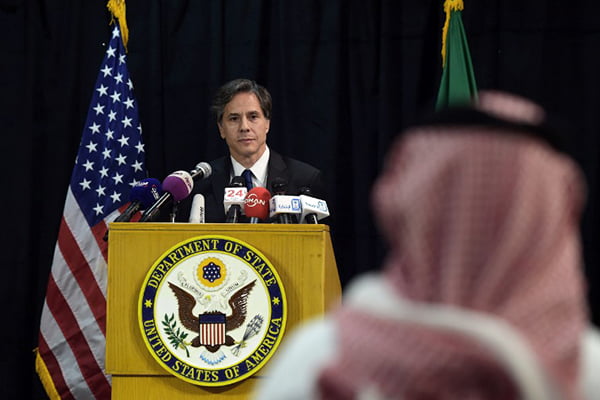
US Secretary of State Antony Blinken discussed the violence in Israel, the West Bank and Gaza in phone calls with the Saudi, Qatari and Egyptian foreign ministers, the State Department said on Sunday.
Blinken and Qatar's Sheikh Mohammed bin Abdulrahman Al-Thani discussed "efforts to restore calm in Israel and the West Bank and Gaza in light of the tragic loss of civilian life", the State Department said.
The Qatari Foreign Ministry said in a statement that the two officials discussed "the recent Israeli attacks on worshippers at the Al-Aqsa Compound and the attack on the besieged Gaza Strip."
Al-Thani stressed the "need for urgent action by the international community to stop the repeated brutal Israeli attacks against civilians in Gaza and the blessed Al-Aqsa Mosque," it added.
Meanwhile, a growing group of US senators on Sunday called for a ceasefire. Democratic Senator Chris Murphy and Republican Todd Young, the senior members of a Foreign Relations panel, said in a statement: "As a result of Hamas’ rocket attacks and Israel’s response, both sides must recognize that too many lives have been lost and must not escalate the conflict further."
Twenty-five other Democratic US senators and two independents issued a separate, similar statement urging an immediate ceasefire.
In his call with Egypt's Sameh Shoukry, Blinken "reiterated his call on all parties to de-escalate tensions and bring a halt to the violence, which has claimed the lives of Israeli and Palestinian civilians, including children", the State Department said in another statement.
Saudi state news agency SPA reported on Sunday that Blinken also had a phone call with Saudi Foreign Minister Prince Faisal bin Farhan to discuss the latest developments "in Palestine and in the region."
The State Department said the two discussed "the ongoing efforts to calm tensions in Israel and the West Bank and Gaza and bring the current violence to an end."
Qatar's Al-Thani also held a phone call on Sunday with Shoukry, in which they reviewed "bilateral cooperation relations and developments in Palestine," the Qatari Foreign Ministry said in a separate statement.
The Egyptian Foreign Ministry said in a statement that the two ministers agreed on "the importance of working to reach an immediate ceasefire between the two sides, and they also agreed to continue coordination in the bilateral framework, as well as in regional and international ones, regarding what is in the interest of the Palestinian people and reaching a ceasefire,"
The truce efforts by Egypt, Qatar and the United Nations have so far offered no sign of progress.
In related developments the Organisation of Islamic Cooperation (OIC) called on Sunday for an immediate halt to what it described as Israel’s barbaric attacks on Gaza and blamed “systematic crimes” against the Palestinians for hostilities now in their seventh day.
The OIC statement came after a virtual meeting in which Saudi Arabia condemned the violation of the sanctity of Muslim holy sites and evictions of Palestinians from their homes in East Jerusalem.
The 57-member body accused the United Nations Security Council of inertia. Saudi Arabia, Bahrain and the UAE called for a ceasefire.
“De-escalation and the highest degree of restraint are important to avoid dragging the region to new levels of instability,” said UAE Minister of State for International Cooperation Reem Al Hashimy.
Pre-dawn Israeli strikes in the centre of Gaza City on Sunday brought the death toll in Gaza to 181, including 47 children, health officials said. Israel has reported 10 dead, including two children.
Jordan’s King Abdullah, meanwhile, said his kingdom is involved in intensive diplomacy to halt what he characterised as Israeli military escalation.
Saudi Foreign Minister Prince Faisal bin Farhan Al Saud opened the OIC meeting by urging the global community to end the escalation in violence and revive peace negotiations based on a two-state solution.
Turkish foreign ministry sources said Foreign Minister Mevlut Cavusoglu called for an international protection mechanism for Palestinian civilians and told the OIC that Israel should be held accountable for war crimes and that the International Criminal Court could play a role.
His Iranian counterpart Mohammad Javad Zarif urged the international community to start a “political and legislative” campaign against Israel, Iranian state media said.
Sources: Asharq Al-Awsat, Khaleej Times





